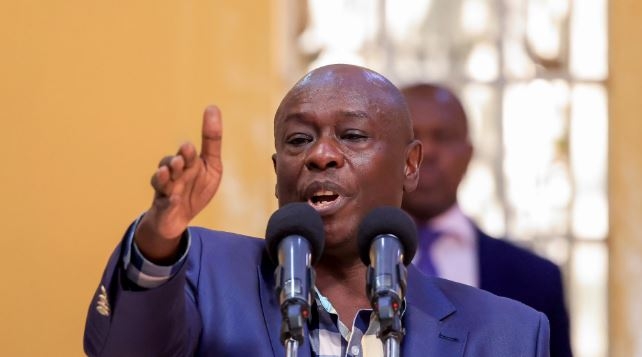Legendary Nigerian novelist, Chinua Achebe, has countless nuggets of wisdom in his hugely popular book, Things Fall Apart.
In one such anecdote in the novel, the oracle of the hills and caves in Umuofia clan decrees that Ikemefuna, a young man from a rival clan who had been brought to live with the main character, Okonkwo, as part of the settlement of a blood debt, must be killed.
However, the oldest man in the village, Ogbuefi Ezeudu, advises Okonkwo that whereas the oracle’s decree requires the clan to kill Ikemefuna, he, Okonkwo, has become like a father to Ikemefuna, and can attend the ceremony without taking part.
“That boy calls you father. Do not bear a hand in is his death”, counsels Ezeudu.
On Thursday last week, as Kenyan senators got down to vote on an amendment to the Division of Revenue Bill, which would have seen counties receive an allocation of Sh407 billion of the Equitable Share of revenue for the next financial year, as opposed the Sh385 billion proposed by the National Treasury, one would have been tempted to whisper to each of them that “Devolution calls you father, do not bear a hand in its death”.
Sadly, as with Okonkwo in Achebe’s book, it turned out that at least 22 senators lacked ears, or emotional intelligence. Or both. In broad daylight, the 22 voted against increasing allocation to the counties.
Article 96 of the Constitution states that one of the roles of the Senate is to determine allocation of national revenue among the counties as per Article 217 of the Constitution and overseeing national revenue allocated to county governments.
For purposes of educating the 22 senators and allied governors who accepted their position on the premise that “the government is broke, and we have to live within our means”, neither article mentions that these roles are subject to the whims of the central government or whether or not it is broke.
Indeed, the founders of our new constitutional order wanted counties specifically as independent safety nets from the perennial emasculation and marginalisation by the national government.
The biggest enemy to the advancement of our country is the sheer spectacle of institutionalized foolishness. You see, both a senator and a governor go to the ballot and receive independent mandates from the people, with the Constitution setting out their roles without ambiguity.
When they take their oath of office, they accept this mandate without fear or favour, so help them God. They do not serve the interest of the Executive and cannot purport to base their decisions on another arm of government. But let us examine this other arm of government briefly. Fresh from hiring 50 CASs, the national government continues to run a massive and expensive bureaucracy at Afya House, even though health is a devolved function, while also engaging in obscene spending on the Executive.
Recent reports of billions used on luxury cars, or on feeding the spending appetite of the presidency, do not support the theory of a cash crunch. Indeed, no less a person than the President’s own economic adviser, Dr David Ndii, has recently been on TV stating unequivocally that the regime’s worst trait is state wastefulness and the shamelessness that accompanies it.
A government facing a cash crunch does not even remotely look like this. For a senator to then deny counties money because “the government is broke” is to both mourn louder than the bereaved and amounts to a morally repugnant assault on his own mandate.
I had a quick look at the list of 22 NAYs. Among them were Samburu, Turkana, West Pokot and several rural counties where any small additional funds would be a shot in the arm towards equipping hospitals, creating ICU wings, expanding ECDE and vocational training units and availing clean drinking water to residents.
The elected senators from these counties, however, chose political expediency, bending to what I suspect is Executive whims to protect an imaginary constituency that was missing from their oath of office. Nevertheless, there is another group of Senators that must be called out.
Whereas 22 opposed and nine supported, a whopping 16 didn’t take part in the vote. With decisions that are as clear-cut as this on matters public interest, absence is a vote for the forces of regression. For Nairobi dwellers like me, we tend to look out for the activities of both our adopted representatives in the city and the elected leaders from our rural homes.
My Nairobi Senator voted with the people, while my rural senator from Kisumu went missing in action. It is important that we refer to the nine senators who stood with the people last Thursday by name so that there will never be any doubts when we check out the right side of history. Enoch Wambua (Kitui), Ledama Olekina (Narok), Edwin Sifuna (Nairobi), Eddy Gicheru Oketch (Migori), Richard Onyonka (Kisii), Moses Kajwang’ (Homa Bay), Godfrey Osotsi (Vihiga), Jones Mwaruma (Taita Taveta) and Oburu Oginga (Siaya).
Let it never be in doubt who the heroes of devolution are, now and in future. In all of it, the conflicted mien of the Council of Governors has been interesting to watch. Dominated by Kenya Kwanza governors, and chaired by UDA’s own Kirinyaga Governor Anne Waiguru, the CoG has obviously been torn between speaking up over the revenue allocation as well as the sticky issue of four-month delay in disbursement of county funds, or speaking in a manner that pleases “the boss”. Appearing before a senate committee within the same week, the CoG chair was at pains to explain her own prolonged silence over the matter. A few of her colleagues were however not averse to echo the words of the 22 senators that they will wait for “better times”.
It prompted a senator to quip that “I am climbing the tree to get you fruits but you are pulling down my shorts”, in reference to the governors. As for the 22 senators and their 16 enablers who skipped the vote, the message from the populace is as simple as this; You were elected as guardian angels of devolution.
If you vote to protect the Executive while sounding a financial death knell to counties, you effectively vote to kill your own relevance as the Senate. There was no ballot paper at the general election marked “sympathy for national government” and you cannot create it now.
In fact, you should be the ones pushing for financial independence of counties from the national treasury, so that the devolved units do not remain beholden to fiscal and revenue failures of national government.
We cannot make one step forward and fifty steps backward. In my view, any Senator who feels the need to protect the executive while trampling on his own mandate should find the courage to resign and let someone else take up that mandate.
In the words of Chinua Achebe, “That boy (devolution) calls you father. Do not bear a hand in his death”.
















